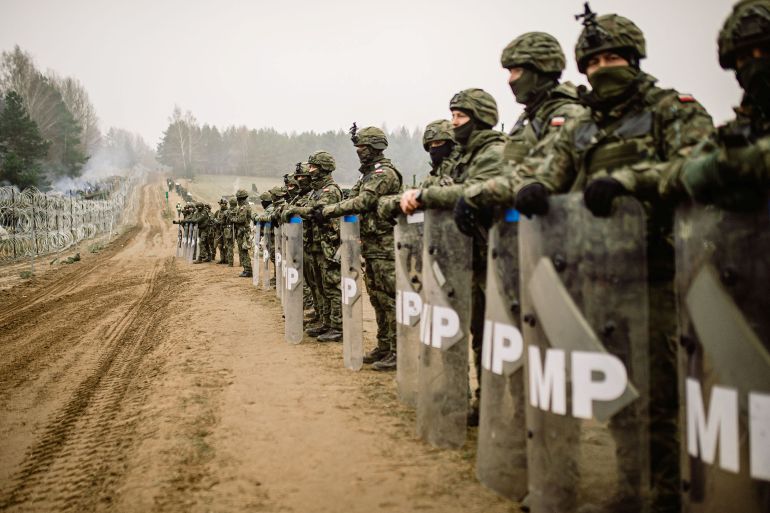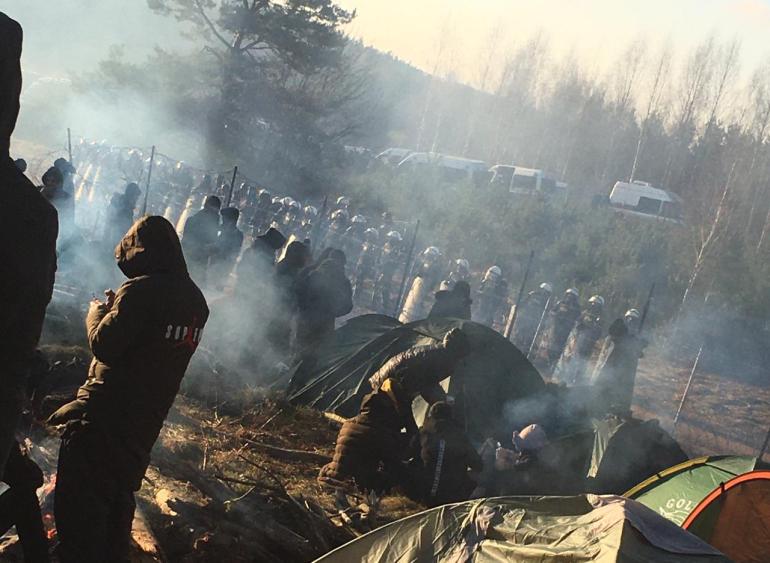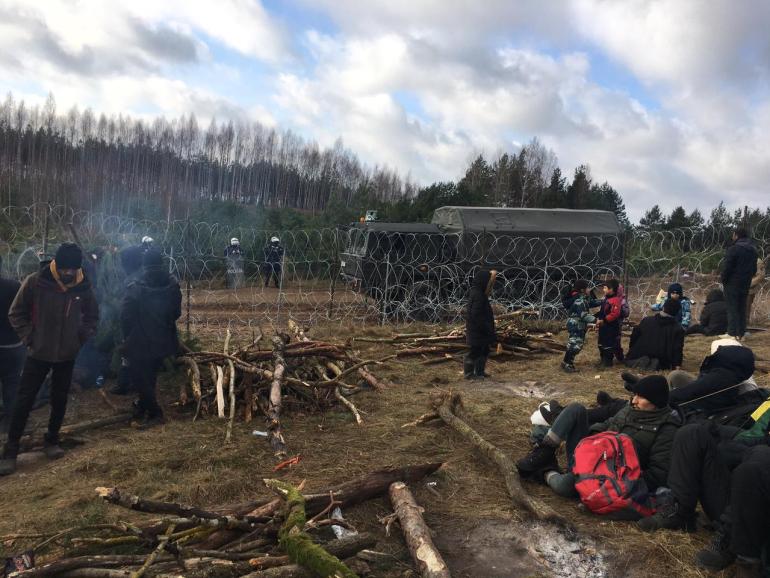At Poland-Belarus border, people decry ‘weaponisation’ depiction
Stranded refugees and migrants say they are in dire need of help as row between European Union and Belarus escalates.

Sokolka, Poland – As a geopolitical conflict continues to simmer, people are dying in the forests on either side of the border between Poland and Belarus.
This weekend, the body of a young Syrian man was found in the woods near the Polish border village of Wolka Terechowska. The cause of death was not immediately known, according to Polish officials.
Keep reading
list of 3 itemsSyrian asylum seeker found dead on Poland-Belarus border
Poland-Belarus border: What you need to know about the crisis
The restricted zone near the border is a forbidden space for reporters and aid workers, with no one except local residents allowed to enter. Reports say that some residents have started putting green lights outside their houses to show they are willing to help people in distress facing freezing conditions and a lack of vital supplies, including medical care.
What happens inside the restricted zone is impossible to fully verify because soldiers and police turn journalists away at every checkpoint. Outside, blankets abandoned on the edge of thick woodlands are often the only reminder that some people have made it through the heavily fortified border.

There is a sense of weariness on the ground from activists who have been calling attention for months to a crisis that people are only just waking up to. Now, thousands of people are camped at the Belarusian border as Poland, a European Union member, has denied them entry amid a standoff with its neighbour.
Mere kilometres from the roadblocks, Kochar*, a 26-year-old Iraqi-Kurdish man, is one of those trapped on the other side of the fence. He sends a WhatsApp location which pins his spot just opposite the Polish Kuznica border crossing point.
Kochar, who feared persecution in Iraq after having worked for a Kurdish political party in Iran, said he read on social media he could take a flight to Belarus’s capital, Minsk, and get to Europe that way.
“You know Iran can do anything in Iraq, maybe one day they will catch me,” he said. There are two options now in his mind: “Die here or die in my country; a lot of us have the same situation.”
A graduate of mathematics from the University of Sulaymaniyah in Iraq, Kochar was hoping that he might have better prospects in the EU, but knows now he has taken a dangerous journey to find a better life. “Sometimes you will do anything to escape death,” he said, even as he realises that he has been caught up in a geopolitical tug of war between the EU and Belarus.
“It’s not humanity [what] Europe and Belarus do with us,” he said. “I know Belarus is using us, but what shall we do?”

Terms such as “hybrid warfare” and “weaponisation” have been used to describe the escalating situation of desperate people lured by Belarusian President Alexander Lukashenko to the EU’s borders – but Kochar finds these terms difficult to digest.
“We don’t like it,” he said, rejecting being described as a “weapon”. “We are here for life, not for fighting,” he said, pointing out the number of young children around him in the makeshift camp.
The situation on his side of the border is desperate. He sends photos of young children with messages for help scrawled on their faces.
There is not enough wood to make fires, there is not enough food for people, and many are sick because of the cold temperatures, he said. “We just want this bad thing to finish,” Kochar added. “It’s a bad thing, [to] use people and forget humanity.”
“I want Europe and all of the world to know that we are in danger. We will die here soon. We will freeze,” he said. “Belarus and Poland use us like a war. We want a good life. We are humans. I don’t want to die here, I have a lot of ambitions, I think Europe is full of humanity, but I don’t see anything until now. Please, please help us.”
‘Deeply dehumanising’ narratives
Maurice Stierl, from activist network Alarm Phone, said European countries have not found any other way to deal with the issue of migration “than to see it as a gigantic political problem, which it, of course, is not. Europe has the means to accommodate a couple of thousand people from the Belarusian forests.”
Stierl went on to describe Belarus’s actions as “obviously shocking”, but added that “when we hear about ‘instrumentalisation’ and migrants as ‘weapons’ it always underplays the fact that these people are not simply some sort of pawns moved around on a chessboard by Lukashenko and other authoritarian leaders – they are individuals who have many reasons for wanting to move”.
Stierl said it was crucial to emphasise the agency of people on the move. “Otherwise, we are always stuck in this binary where they can be understood only as military threats or as absolute victims – and, in many ways, both narratives are deeply dehumanising.”
Meanwhile, those caught up in the turmoil on the ground continue to find themselves in dire straits. Early on Sunday morning, Kochar messaged to say that he had fallen ill.
“The Belarusian soldiers told us we should cut the border today; if we don’t do [it] they push and hit us, everyone is so upset about it,” he said.
“We aren’t doing anything until now and we don’t let others to do,” he continued, adding that he did not want to cut the border fence, either. “We will be strong,” read his last message. “I hope we stay in life.”
*Name changed to protect identity